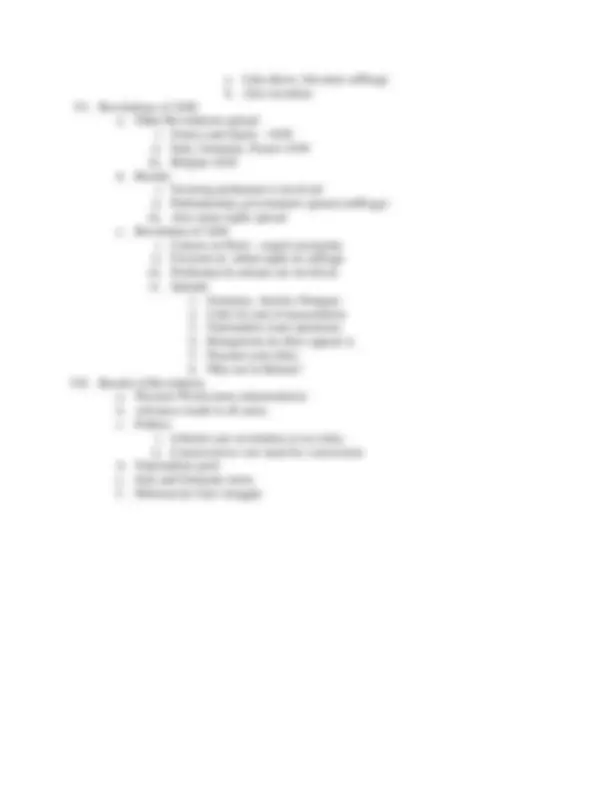



Study with the several resources on Docsity

Earn points by helping other students or get them with a premium plan


Prepare for your exams
Study with the several resources on Docsity

Earn points to download
Earn points by helping other students or get them with a premium plan
Community
Ask the community for help and clear up your study doubts
Discover the best universities in your country according to Docsity users
Free resources
Download our free guides on studying techniques, anxiety management strategies, and thesis advice from Docsity tutors
Material Type: Notes; Professor: May; Class: World Civilization; Subject: History; University: North Georgia College & State University; Term: Unknown 1989;
Typology: Study notes
1 / 3

This page cannot be seen from the preview
Don't miss anything!


I. 1775-1848 Age of Revolution a. Industrial Revolution b. American Revolution-1776-- c. French Revolution—1789— d. Revolutions of 1848 e. Rise of Nationalism II. Industrial Revolution a. Europe shifts from agriculture and handicrafts b. New economy is manufacturing in a factory system c. Why did Industrialization begin in Britain? i. Transportation system ii. World’s largest fleet to carry products iii. World wide colonial markets iv. Bank of England – provides credit v. Stable currency vi. Wealth for investment d. Agricultural improvements = increase in food production e. Increased income = greater purchasing power f. Population growth = surplus labor g. Surplus labor = growth of cities h. New Inventions i. Flying shuttle j. Spinning Jenny -- k. James Watt – steam engine (coal)-1770s l. Applied to mining and weaving (surplus cotton) m. Henry Cort – wrought iron n. Coal and Iron fuel industrial growth o. Cyrus McCormick & the Reaper-- p. The Factory System i. Discipline ii. Child Labor iii. Bourgeois class (bourgeoisie) iv. Proletariat class v. Resistance III. American Revolution a. Declaration of Independence 1776 b. Keys to success c. Persistence d. British Blunders e. French Intervention
f. Constitution 1789 i. Enlightenment principles ii. Checks and balances iii. Individual Liberties iv. Voting Rights IV. French Revolution a. Fueled by American Revolution b. Enlightenment c. Population growth and Peasant discontent d. Louis XVI called for meeting i. Bourgeoisie took it over e. Declaration of Rights of Man f. Bastille—July 14, 1789 g. Peasants—attack manorialism h. Attack Church i. New Constitution j. Radical Phase i. 1792 reforms turn Radical ii. Foreign Invasion iii. Guillotine & Reign of Terror iv. Maximilian Robespierre (1758-1794) v. Nationalism Rise V. Rise of Bonaparte a. Napoleonic Era b. 1799 Napoleon Bonaparte comes to power c. Republic becomes Empire i. Limits some rights ii. Ensures others iii. Begins expansion d. Continental System e. 1812-holds most of Europe i. Invades Russia f. Waterloo g. Congress of Vienna i. How to Punish France ii. Restore balance of Power iii. Preserve Monarchy iv. Opposed Revolution v. Political groups grow